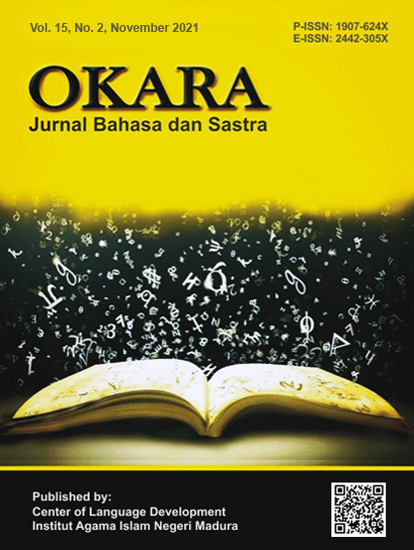‘Tilik’: A Study of Power Among Javanese Women Through Gossip
 Abstract views: 560
,
Abstract views: 560
,
 PDF downloads: 480
PDF downloads: 480
Abstract
Gossip plays a crucial part in our communicative and social behavior as it is thought to be a manifestation of any ‘ordinary’ everyday life. Interestingly, the portrayal of gossip in Javanese culture can be found in the recent viral short movie Tilik (The Ladies on Top). Unfortunately, contemporary interpretations and discussions about Bu Tejo often focus only on what gossip is about and its negative effect on the image of women. None of them observed the relation between gossip and power. Thus, the study aims to analyze gossip in Tilik movie by using the concept of power among Javanese women. The writer used the qualitative method. The writer focused on the theory of gossip and power; and used the concept of power among Javanese women proposed by Handayani and Novianto. This research revealed that gossip in Tilik becomes the weapon of choice in the female arsenal due to the rivalry between Bu Tejo and Dian. Bu Tejo’s negative attitude towards Dian can be seen as a political tactic for Javanese women, and the personal is political. Lastly, the acts of gossiping in the movie match with the concept of how Javanese women play the game of power through srawung (socialization).
Downloads
References
Archer, John. “Sex Differences in Aggression in Real-World Settings: A Meta Analytic Review.” Review of General Psychology 8, no. 4 (2004): 291–322.
Bakhtin, Mikhail Mikhailovich. Art and Answerability. Edited by Michael Holquist and Vadim Liapunov. Austin: The University of Texas Press, 1990.
Bakhtin, Mikhail Mikhailovich. “The Dialogic Imagination: Four Essays.” In Theory of the Novel, edited by Michael McKeon, 321–54. Baltimore: The John Hopkins University Press, 2000.
Baumeister, Roy F., Liqing Zhang, and Kathleen D. Vohs. “Gossip as Cultural Learning.” Review of General Psychology 8, no. 2 (2004): 111–21. https://doi.org/10.1037/1089-2680.8.2.111.
Christina. “The Analysis of Bu Tejo’s Language in Short Movie ‘Tilik.’” Metaphor 3, no. 1 (2020): 56–67.
Cross, Catharine, and Anne C. Campbell. “Violence and Aggression in Women.” In The Evolution of Violence, edited by Todd K. Shackelford and Ranald D. Hansen, 211–32. New York: Springer, 2014.
Farley, Sally D. “Is Gossip Power? The Inverse Relationships between Gossip, Power, and Likability.” European Journal of Social Psychology 41, no. 5 (2011): 574–79. https://doi.org/10.1002/ejsp.821.
Farley, Sally D. “On the Nature of Gossip, Reputation, and Power Inequality.” In The Oxford Handbook of Gossip and Reputation, edited by Francesca Giardini and Rafael Wittek, 343–58. New York: Oxford University Press, 2019.
Foster, Eric K. “Research on Gossip: Taxonomy, Methods, and Future Directions.” Review of General Psychology 8, no. 2 (2004): 78–99. https://doi.org/10.1037/1089-2680.8.2.78.
Giardini, Francesca, and Rafael Wittek. “Introduction: Gossip and Reputation-A Multidisciplinary Research Program.” In The Oxford Handbook of Gossip and Reputation, edited by Francesca Giardini and Rafael Wittek, 1–24. New York: Oxford University Press, 2019.
Handayani, Christina S., and Ardhian Novianto. Kuasa Wanita Jawa. Edited by Retno Suffatni. Yogyakarta: PT LKiS Printing Cemerlang, 2004.
Huskey, Richard. “Gossip: More than Just Trash Talk.” Current Biology 31, no. 12 (2021): 783–86. https://doi.org/10.1016/j.cub.2021.04.048.
Inayaturrobbani, Fakhirah. “Memahami Fungsi Gosip dalam Masyarakat Melalui Film Pendek ‘Tilik.’” TONIL: Jurnal Kajian Sastra, Teater dan Sinema 17, no. 2 (2020): 41–54. https://doi.org/10.24821/tnl.v17i2.4353.
Johannesdottir, Greta Bergrun, Thoroddur Bjarnason, Aileen Stockdale, and Tialda Haartsen. “What’s Love Got to Do with It? Love-Life Gossip and Migration Intentions in Rural Iceland.” Journal of Rural Studies 87 (2021): 236–42. https://doi.org/10.1016/j.jrurstud.2021.09.019.
Lestari, Prembayun Miji, Djatmika, Sumarlam, and Dwi Purnanto. “The Structure Pattern of Ngrasani ‘Gossiping’ by Javanese Women in Indonesia.” Australasian Journal of Educational Technology 35, no. 1 (2019): 116–29.
McAndrew, Francis T. “The ‘Sword of a Woman’: Gossip and Female Aggression.” Aggression and Violent Behavior 19, no. 3 (2014): 196–99.
McAndrew, Francis T. “The ‘Sword of a Woman’: Gossip and Female Aggression.” Aggression and Violent Behavior 19, no. 3 (2014): 196–99. https://doi.org/10.1016/j.avb.2014.04.006.
McAndrew, Frank, and Megan A. Milenkovic. “Of Tabloids and Family Secrets: The Evolutionary Psychology of Gossip.” Journal of Applied Social Psychology 32, no. 5 (2002): 1064–82. https://doi.org/10.1111/j.1559-1816.2002.tb00256.x.
Merdeka, Moyang Kasih Dewi. “Tilik dan Riwayat Film Pendek Kita.” Tempo, September 4, 2020. https://majalah.tempo.co/read/selingan/161344/tilik-dan-riwayat-film-pendek-kita.
Nurhablisyah, Nurhablisyah, and Khikmah Susanti. “Analisis Isi ‘Tilik’ Sebuah Tinjauan Narasi Film David Bordwell.” Jurnal Ilmu Komunikasi UHO : Jurnal Penelitian Kajian Ilmu Komunikasi dan Informasi 5, no. 4 (2020): 315–29. https://doi.org/10.52423/jikuho.v5i4.14460.
Pambudy, Ninuk M. “Menilik Lagi ”Tilik”.” Kompas.Id, September 12, 2020. https://www.kompas.id/baca/opini/2020/09/12/menilik-lagi-tilik/.
Suryakusuma, Julia. “‘Tilik’, Sexist Stereotypes and Our Collective Insanity.” The Jakarta Post, September 16, 2020. https://www.thejakartapost.com/academia/2020/09/16/tilik-sexist-stereotypes-and-our-collective-insanity.html.
The journal operates an Open Access policy under a Creative Commons Attribution-NonCommercial 4.0 International License. Authors who publish with this journal agree to the following terms:
- Authors retain copyright and grant the journal right of first publication with the work simultaneously licensed under a Creative Commons Attribution License that allows others to share the work with an acknowledgement of the work's authorship and initial publication in this journal.
- Authors are able to enter into separate, additional contractual arrangements for the non-exclusive distribution of the journal's published version of the work (e.g., post it to an institutional repository or publish it in a book), with an acknowledgement of its initial publication in this journal.
- Authors are permitted and encouraged to post their work online (e.g., in institutional repositories or on their website) prior to and during the submission process, as it can lead to productive exchanges, as well as earlier and greater citation of published work.





_(1).png)
.png)
.png)
1.png)
.png)
.png)

.png)
_-_Copy_-_Copy.png)





